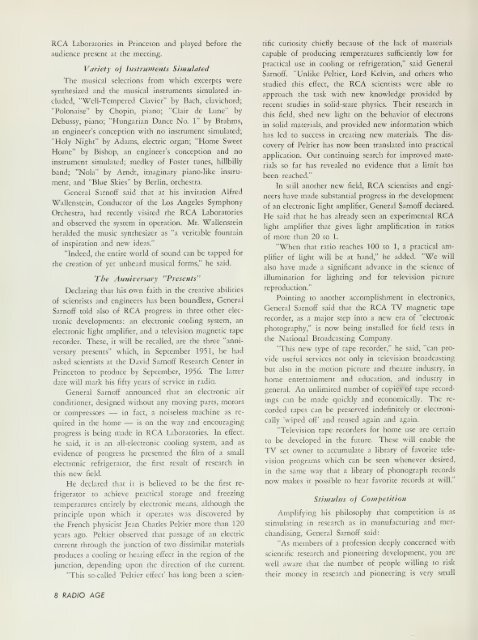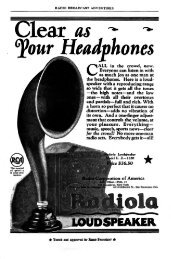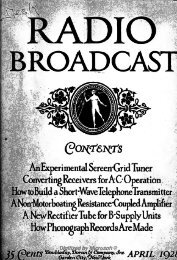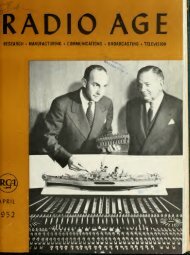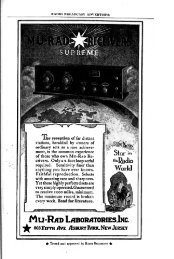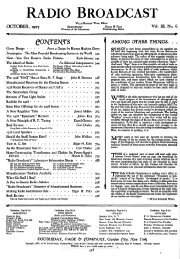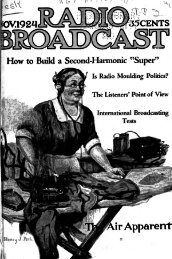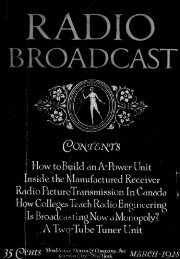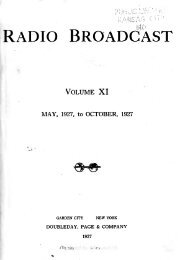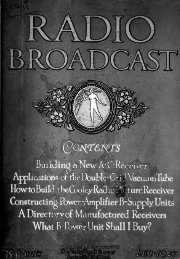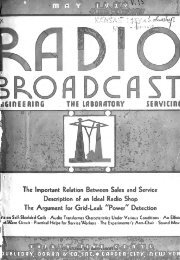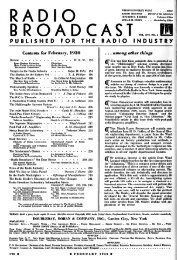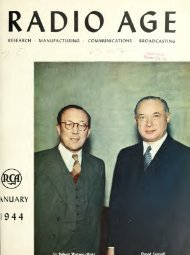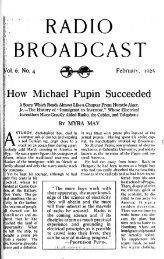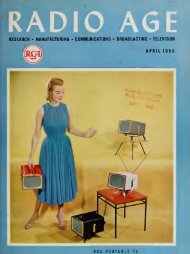Radio Age - 1955, April - 36 Pages, 2.8 MB, .PDF - VacuumTubeEra
Radio Age - 1955, April - 36 Pages, 2.8 MB, .PDF - VacuumTubeEra
Radio Age - 1955, April - 36 Pages, 2.8 MB, .PDF - VacuumTubeEra
Create successful ePaper yourself
Turn your PDF publications into a flip-book with our unique Google optimized e-Paper software.
RCA Laboratories in Princeton and played before the<br />
audience present at the meeting.<br />
Variety of Instruments Simulated<br />
The musical selections from which excerpts were<br />
synthesized and the musical instruments simulated included,<br />
"Well-Tempered Clavier" by Bach, clavichord;<br />
"Polonaise" by Chopin, piano; "Clair de Lune" by<br />
Debussy, piano; "Hungarian Dance No. 1" by Brahms,<br />
an engineer's conception with no instrument simulated;<br />
"Holy Night" by Adams, electric organ; "Home Sweet<br />
Home" by Bishop, an engineer's conception and no<br />
instrument simulated; medley of Foster tunes, hillbilly<br />
band; "Nola" by Arndt, imaginary piano-like instrument,<br />
and "Blue Skies" by Berlin, orchestra.<br />
General Sarnoff said that at his invitation Alfred<br />
Wallenstein, Conductor of the Los Angeles Symphony<br />
Orchestra, had recently visited the RCA Laboratories<br />
and observed the system in operation. Mr. Wallenstein<br />
heralded the music synthesizer as "a veritable fountain<br />
of inspiration and new ideas."<br />
"Indeed, the entire world of sound can be tapped for<br />
the creation of yet unheard musical forms," he said.<br />
The Anniversary<br />
"Presents"<br />
Declaring that his own faith in the creative abilities<br />
of scientists and engineers has been boundless, General<br />
Sarnoff told also of RCA progress in three other electronic<br />
developments: an electronic cooling system, an<br />
electronic light amplifier, and a television magnetic tape<br />
recorder. These, it will be recalled, are the three "anniversary<br />
presents" which, in September 1951, he had<br />
asked scientists at the David Sarnoff Research Center in<br />
Princeton to produce by September, 1956. The latter<br />
date will mark his fifty years of service in radio.<br />
General Sarnoff announced that an electronic air<br />
conditioner, designed without any moving parts, motors<br />
or compressors — in fact, a noiseless machine as required<br />
in the home — is on the way and encouraging<br />
progress is being made in RCA Laboratories. In effect,<br />
he said, it is an all-electronic cooling system, and as<br />
evidence of progress he presented the film of a small<br />
electronic refrigerator, the first result of research in<br />
this new field.<br />
He declared that it is believed to be the first refrigerator<br />
to achieve practical storage and freezing<br />
temperatures entirely by electronic means, although the<br />
principle upon which it operates was discovered by<br />
the French physicist Jean Charles Peltier more than 120<br />
years ago. Peltier observed that passage of an electric<br />
current through the junction of two dissimilar materials<br />
produces a cooling or heating effect in the region of the<br />
junction, depending upon the direction of the current.<br />
"This so-called 'Peltier effect' has long been a scientific<br />
curiosity chiefly because of the lack of materials<br />
capable of producing temperatures sufficiently low for<br />
practical use in cooling or refrigeration," said General<br />
Sarnoff. "Unlike Peltier, Lord Kelvin, and others who<br />
studied this effect, the RCA scientists were able to<br />
approach the task with new knowledge provided by<br />
recent studies in solid-state physics. Their research in<br />
this field, shed new light on the behavior of electrons<br />
in solid materials, and provided new information which<br />
has led to success in creating new materials. The discovery<br />
of Peltier has now been translated into practical<br />
application. Our continuing search for improved materials<br />
so far has revealed no evidence that a limit has<br />
been reached."<br />
In still another new field, RCA scientists and engineers<br />
have made substantial progress in the development<br />
of an electronic light amplifier, General Sarnoff declared.<br />
He said that he has already seen an experimental RCA<br />
light amplifier that gives light amplification in ratios<br />
of more than 20 to 1.<br />
"When that ratio reaches 100 to 1, a practical amplifier<br />
of light will be at hand," he added. "We will<br />
also have made a significant advance in the science of<br />
illumination for lighting and for television picture<br />
reproduction."<br />
Pointing to another accomplishment in electronics,<br />
General Sarnoff said that the RCA TV magnetic tape<br />
recorder, as a major step into a new era of "electronic<br />
photography," is now being installed for field tests in<br />
the National Broadcasting Company.<br />
"This new type of tape recorder," he said, "can provide<br />
useful services not only in television broadcasting<br />
but also in the motion picture and theatre industry, in<br />
home entertainment and education, and industry in<br />
general. An unlimited number of copies of tape recordings<br />
can be made quickly and economically. The recorded<br />
tapes can be preserved indefinitely or electronically<br />
'wiped off' and reused again and again.<br />
"Television tape recorders for home use are certain<br />
to be developed in the future. These will enable the<br />
TV set owner to accumulate a library of favorite television<br />
programs which can be seen whenever desired,<br />
in the same way that a library of phonograph records<br />
now makes it possible to hear favorite records at will."<br />
Stimulus of Competition<br />
Amplifying his philosophy that competition is as<br />
stimulating in research as in manufacturing and merchandising,<br />
General Sarnoff said:<br />
"As members of a profession deeply concerned with<br />
scientific research and pioneering development, you are<br />
well aware that the number of people willing to risk<br />
their money in research and pioneering is very small<br />
8 RADIO AGE


